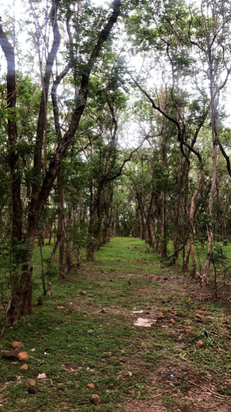Reflections: Idea of Nature
- Manan Goyal
- Jun 2, 2020
- 2 min read
The following blog draws reflections on reading, Excerpts from The End of Nature by Bill McKibben, which is part of the book Environment and society by Christopher Schlottmann.
“The natural world is not only a set of constraints but of contexts within which we can more fully realise our dream” - Paul Shepard.
The reading provides an overview of the kind of interaction a man has with nature. The understanding which most appeals to me of nature is as 'Prakriti' the source of all energy; a more philosophical aspect originating from Samkhya Hindu philosophy; which also echoes with the earliest Greek philosophers, who saw no difference between matter and consciousness - nature included everything.
In my own experience, I’ve had some close encounters with nature which was liberating and mesmerising in its own sense. And ever since in my own practise as an urban planner and designer background I make a constant attempt to question the conventional approach and understanding towards current practices in urbanism, which also the author makes the reader constantly aware of. The author very strongly put forth the statement that “we have changed the atmosphere, and that will change the weather”.
The author maps our journey and our engagement with the environment. And in this journey, the author brings about the child-like aspect in the journey which human-made, in which he illustrates that we are also children of nature and as a bird struggles to make its nest, so does a human. But during this journey, the man lost the awareness of integrating itself in nature and ended up taking paths which failed to show them the ripple effect. As the author says, we never thought we had wrecked nature up until this point. Elaborating to this point further, let us take the example of plastic. When plastic was invented, it was considered as an evolutionary idea, solving and catering a diverse human need. But soon the mass production of plastic started to affect our ecology up until now we realised this ripple effect down the lane. Our habits, our economies and our ways of life started to influence un-civilisable forces of nature such as temperature and rainfall.

Until the 18th Century, Paul Brooks points out through his literature Speaking for Nature, wilderness as ugly and crude until the rise of the romantic movement. But throughout history nature has held the pedestal of Mother, as evident in all ancient religious texts. To reverse these innocent but evil mistakes which man-made along the journey to find its place in this diverse space; we must learn to blur the well-defined boundaries which separate human society from nature.
I strongly agree with the author’s stance on realising that nature is ended is complex. If one goes beyond the immediate history of wars and human horrors, one may critically understand that nature has its unique way of restoring itself to life. Dinosaurs which were one the major dominant species of nature are now an extinct chapter even in the books of history.

Through our interventions, have we destroyed nature or have we created un-habitable conditions for humans (and other species), is a question one should critically ponder upon! “The earth and its community of life are untrammelled by man, where man himself is a visitor who does not remain.”














Comments